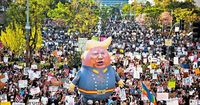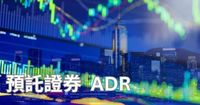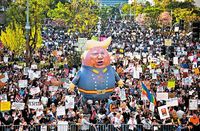As the Golden Week holiday comes to a close, investors brace for what some are calling a potential "Black Monday" in Hong Kong's stock market. The Hang Seng Index (HSI) saw its weekend futures plummet to 21,406 points, marking a staggering decline of 1,443 points or 6% compared to the HSI spot price. This downturn comes amid growing concerns over the implications of new tariffs announced by the U.S. government under President Trump, which have triggered a wave of margin calls from major Wall Street banks to hedge fund clients.
According to reports, hedge funds are being forced to liquidate assets as the value of their holdings has significantly dropped. The Golden Dragon Index, which tracks Chinese stocks listed in the U.S., fell by 8.87%, while the Nasdaq China Golden Dragon Index closed at 6,880 points, also down 8.87%. Notably, shares of Alibaba (BABA) once dipped by 11.5%, while Pinduoduo (PDD) closed down 8.32%, and JD.com (JD) fell by half. Tencent (700) saw its American Depository Receipts (ADR) drop nearly 7%, and Meituan (3690) ADR fell 8.45%.
The situation has analysts worried. Experts suggest that if the Hang Seng Index falls below 22,000 points, it could trigger a wave of buying from investors looking for bargains. The recent announcement of equivalent tariffs, which exceed 60% on Chinese goods, has led to retaliatory measures from China, imposing 34% tariffs on U.S. imports. This escalating trade war has left many investors recalibrating their expectations regarding the value of Chinese assets.
"The market has completely underestimated China's determination to retaliate," said Lu Ting, chief economist at Nomura China. He emphasized that there is no immediate expectation for a summit or negotiations between the U.S. and China, increasing the risk of deteriorating relations. The tariffs, combined with the existing 10% tariffs introduced earlier this year, have pushed the average tax rate on Chinese goods entering the U.S. to approximately 66%.
Independent stock commentator Wen Jia warned that the Singapore Exchange's MSCI Singapore Free Index futures, commonly referred to as "Black Monday," were reported to be over 1,000 points lower than the Hang Seng Index. He predicted that Hong Kong stocks would likely fall by 800 to 1,000 points when trading resumes on April 7, 2025. Despite this bleak outlook, some retail investors remain optimistic, with many reportedly asking about potential buying opportunities.
Goldman Sachs has quickly adjusted its targets for two China-related indices downward, reflecting the increased uncertainty in the market. The MSCI China Index target was cut by 4.7% to 81 points, while the A-share CSI 300 Index target was lowered by 4.25% to 4,500 points. Analysts believe that the short-term risk of a market downturn and profit-taking pressures may hinder the bull market for Chinese stocks.
As the global markets react to the U.S. tariffs, Wall Street experienced a severe downturn, with the three major indices suffering significant losses over two consecutive days. The Dow Jones Industrial Average fell by 3,910 points, while the Nasdaq dropped nearly 2,000 points, entering a technical bear market. The S&P 500 also saw a decline of nearly 600 points.
In light of these developments, Morgan Stanley has raised concerns that the tariff policies could lead the U.S. into an economic recession this year. The likelihood of a downturn has increased from 25% to between 30% and 35%, according to Standard & Poor's Global. The repercussions of these tariffs are already being felt, with a significant flight of capital from U.S. assets as investors seek safer havens.
While the Hong Kong market was closed for the holiday last week, the Shanghai Composite Index and the Hang Seng Index recorded slight declines of 0.2% and 1.5%, respectively. Taiwan's stock market also closed for two days, but measures are being implemented to stabilize the market, including reducing the number of entrusted short-selling shares and increasing margin ratios for securities financing.
Looking ahead, analysts expect that mainland authorities will accelerate policies to bolster consumption and the property market to support economic growth. Additionally, there is speculation that the Chinese government may cut the reserve requirement ratio to inject liquidity into the market. The overall sentiment remains cautious, with many investors keeping a close eye on upcoming financial data from both the U.S. and China.
As the markets brace for the impact of the tariffs, it remains to be seen how the situation will unfold in the coming weeks. The interplay between U.S. and Chinese economic policies will be critical in shaping market dynamics, and investors are advised to stay informed and prepared for potential volatility.







